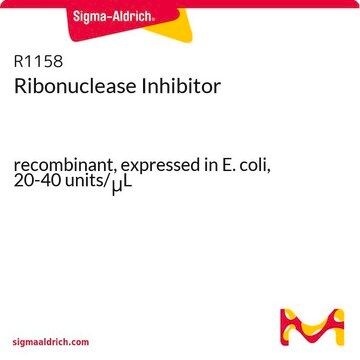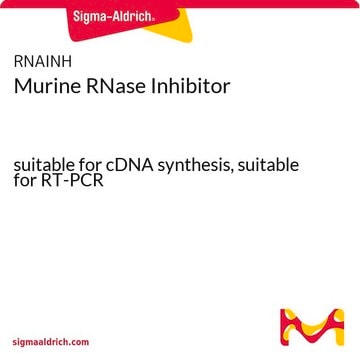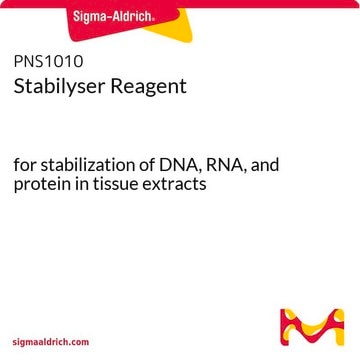R7397
ProtectRNA™ RNase Inhibitor 500× Concentrate
RNase inhibitor for in situ hybridization assays
Sinónimos:
Ribonuclease inhibitor ProtectRNA™
Iniciar sesiónpara Ver la Fijación de precios por contrato y de la organización
About This Item
UNSPSC Code:
41106300
NACRES:
NA.52
Productos recomendados
form
liquid
storage temp.
2-8°C
General description
Not recommended in systems where other enzymatic activity is required.
ProtectRNA™ ribonuclease(RNase) Inhibitor inhibits most nucleic acid binding enzymes such as RNase and DNase, reverse transcriptase, some RNA and DNA polymerases, protein synthesis enzymes, and several restriction endonucleases. In contrast, ProtectRNA does not interfere with DNA and RNA hybridizations. The action ofProtectRNA as a nuclease inhibitor can be used as an advantage for in situ hybridization. ProtectRNA is useful during all steps of in situ hybridization for tissue RNA protection from RNase degradation. It is recommended to add ProtectRNA to all aqueous solutions used, from as early as the deparaffinization step until the hybridization is completed.
ProtectRNA™ ribonuclease(RNase) Inhibitor inhibits most nucleic acid binding enzymes such as RNase and DNase, reverse transcriptase, some RNA and DNA polymerases, protein synthesis enzymes, and several restriction endonucleases. In contrast, ProtectRNA does not interfere with DNA and RNA hybridizations. The action ofProtectRNA as a nuclease inhibitor can be used as an advantage for in situ hybridization. ProtectRNA is useful during all steps of in situ hybridization for tissue RNA protection from RNase degradation. It is recommended to add ProtectRNA to all aqueous solutions used, from as early as the deparaffinization step until the hybridization is completed.
Application
ProtectRNA™ RNase Inhibitor 500× Concentrate has been used in:
- RNA extraction
- tissue sectioning and staining for laser capture microscopy
- the isolation of blood vessels from hippocampi
ProtectRNA™ RNase Inhibitor 500× Concentrate is an RNase inhibitor.
A potent inhibitor of most nucleic acid binding enzymes, and thus useful as an RNase inhibitor. Especially useful when performing in situ hybridization. If it is added to all aqueous solutions used, it eliminates the need for special glassware washing and after-wash treatments. The 500x concentrate is economical; 2 ml treats 1,000 ml of solution. Not recommended in systems where other enzymatic activity is required.
Features and Benefits
- The 500× concentrate is economical
- Eliminates the need for special dishwashing and“after washing” cleaning and treatments.
Quantity
2mL treats 1,000ml of solution.
Other Notes
This product is for R&D use only, not for drug, household, or other uses.
Legal Information
ProtectRNA is a trademark of Sigma-Aldrich Co. LLC
signalword
Warning
hcodes
Hazard Classifications
Flam. Liq. 3 - Met. Corr. 1
Storage Class
3 - Flammable liquids
wgk_germany
WGK 2
flash_point_f
140.0 °F - closed cup
flash_point_c
60 °C - closed cup
Certificados de análisis (COA)
Busque Certificados de análisis (COA) introduciendo el número de lote del producto. Los números de lote se encuentran en la etiqueta del producto después de las palabras «Lot» o «Batch»
¿Ya tiene este producto?
Encuentre la documentación para los productos que ha comprado recientemente en la Biblioteca de documentos.
Los clientes también vieron
Potential neurotoxicity of titanium implants: Prospective, in-vivo and in-vitro study
Shahar S, et al.
Biomaterials, 276, 121039-121039 (2021)
Exposing the Three-Dimensional Biogeography and Metabolic States of Pathogens in Cystic Fibrosis Sputum via Hydrogel Embedding, Clearing, and rRNA Labeling.
DePas WH
mBio, 7(5), e00796-e00716 (2016)
Emily F Merritt et al.
mSphere, 5(5) (2020-09-04)
Toxoplasma gondii's tropism for and persistence in the central nervous system (CNS) underlies the symptomatic disease that T. gondii causes in humans. Our recent work has shown that neurons are the primary CNS cell with which Toxoplasma interacts and which
Intestinal epithelial cells express immunomodulatory ISG15 during active ulcerative colitis and Crohn?s disease
?stvik AE, et al.
Journal of Crohn's & Colitis, 14(7), 920-934 (2020)
Gene expression analysis of interferon kappa in laser capture microdissected cervical epithelium.
DeCarlo CA
Analytical Biochemistry, 381(1), 59-66 (2008)
Nuestro equipo de científicos tiene experiencia en todas las áreas de investigación: Ciencias de la vida, Ciencia de los materiales, Síntesis química, Cromatografía, Analítica y muchas otras.
Póngase en contacto con el Servicio técnico












